|
Prussia 1807-1947
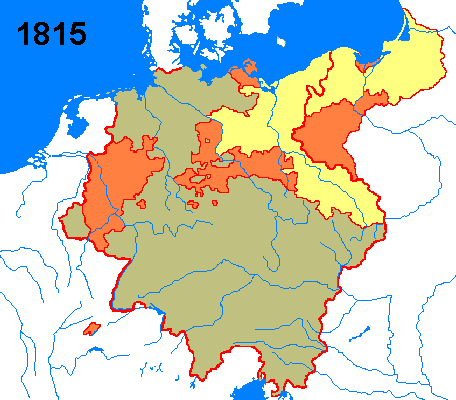
 = Prussia 1807
= Prussia 1807
 = Territorial gains 1815
= Territorial gains 1815
 = German Confederation
= German Confederation
When Napoleon’s Russian campaign ended in disaster 1812
Prussia joined France’s enemies again and its status as great power was
restored at the Congress of Vienna. Its population and territory were
roughly the same size as before 1806, but the territory had shifted to the
south-west and a greater proportion of its population was therefore of
German nationality in a greater extent. The German Confederation was
created at the same time as a replacement for the dissolved Holy Roman
Empire, this institution would however with time be more and more regarded
as temporary solution only. The issue of Germany’s unification would
dominate the next half century
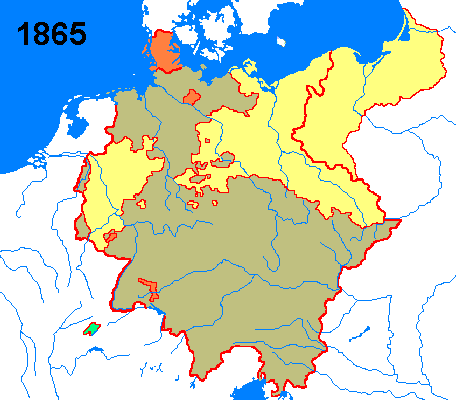
 = Prussia 1815
= Prussia 1815
 = Territorial gains
= Territorial gains
 = Territorial loss 1857
= Territorial loss 1857
There were two alternatives in how Germany would be
unified, the Great German alternative that included all German states and
the Little German alternative that excluded Austria with its large
non-German population. Prussia preferred the Little German solution
because its king would in that case be the obvious choice as German
emperor. The unification of Germany appeared to be imminent during the
revolutionary year of 1848 and Prussia’s king Friedrich Wilhelm IV was the
year after offered the Imperial crown by a German national assembly in
Frankfurt, but he declined the offer, most likely because of the threat
from Austria and Russia. A few months later Prussia along with Hanover and
Saxony made another attempt to under less revolutionary forms pull through
a Little German solution, but it failed again because of opposition from
Austria and Russia and German Confederation was restored instead. Prussia
had simultaneously with these events also supported Schleswig-Holstein’s
rebellion against Denmark, but the other great powers put pressure on
Prussia and the conflict was settled on the basis of status quo 1852. The
revolution of 1848 had also resulted in that Prussia lost control over
Neuchatel in Switzerland, which was formally recognised by Friedrich
Wilhelm IV 1857, but this loss was compensated by the inheritance of the
principality of Hohenzollern 1849.
The conflict over Schleswig-Holstein erupted again 1864
and together with Austria the Prussian troops defeated the Danish army.
Denmark was forced to cede Schleswig-Holstein and Lauenburg in the peace,
but Austria and Prussia could not agree on how these territories would be
governed, Austria wanted Schleswig-Holstein to be an independent state
while Prussia wanted to incorporate it Prussia. The two powers agreed to a
temporary solution 1865, which meant that Schleswig would be under
Prussian administration and Holstein under Austrian administration until a
permanent settlement could be reached. Lauenburg was incorporated into
Prussia after the Austrian had sold their half of that duchy
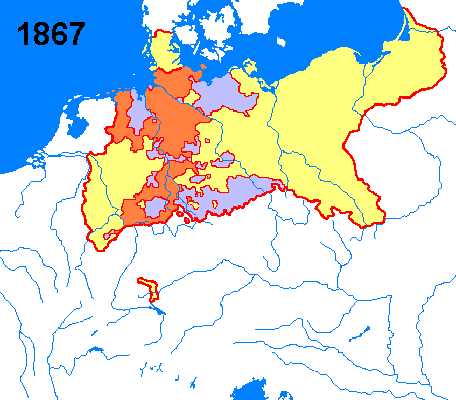
 = Prussia 1865
= Prussia 1865
 = Territorial gains 1866
= Territorial gains 1866
 = Other members of the North German Confederation
= Other members of the North German Confederation
The feud over Schleswig-Holstein’s future proved to be
hard to solve, the main reason to this was Prussia’s unwillingness to
compromise. Austria offered Holstein to Prussia in exchange for a
corresponding territory in Silesia, but Prussia led by their chancellor
Bismarck refused to accept that offer. Instead they resumed the old issue
of Germany’s unification, but the German princes voted down Prussia’s
proposition to this. When the majority in the German Confederation took
side with Austria, Prussia responded by declaring its secession from the
Confederation whereby war became unavoidable. Although Hanover, Saxony,
Bavaria and other German states supported Austria in the war the Prussians
triumphed. The well-equipped Prussian army used with great skill the
railroad to move its troops fast and was victorious on all fronts. Vast
territories were conquered, including all of Hanover, and the German
Confederation was dissolved and replaced by the North German Confederation
that was completely dominated by Prussia when Austria and the southern
German states were left out.
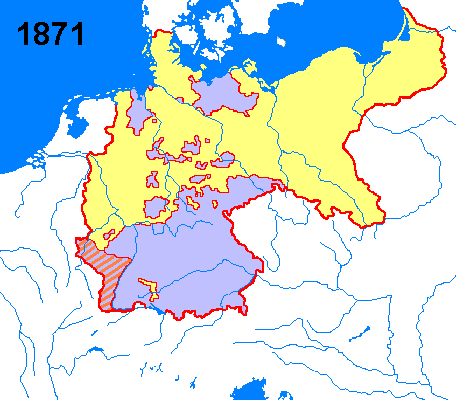
 = Prussia
= Prussia
 = Territorial gain 1871
= Territorial gain 1871
 = Other parts of the German Empire
= Other parts of the German Empire
Prussia’s growth of power was regarded with disapproval by
France’s emperor Napoleon III. He considered the possibility of a unified
Germany as a great threat to France but the war of 1866 ended before he
could intervened. Napoleon III was however determined to repair his
mistake as soon as possible and an insignificant diplomatic dispute in
1870 was used as pretext to declare war against Prussia. But to his
surprise the southern German states joined the war on Prussia’s side and
the French army was decisively defeated. At Versailles the victors
declared the unification of Germany with the Prussian king as its emperor
1871. France was forced to cede Alsace-Lorraine, which was to be
administrated jointly by the German part states as an Imperial territory.
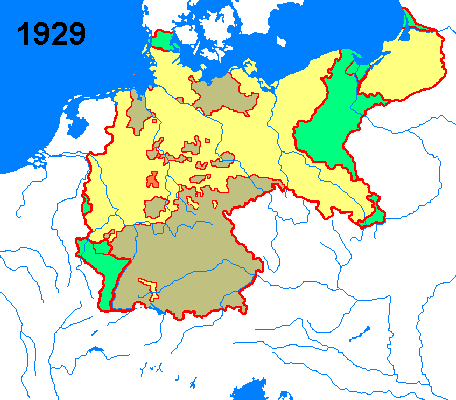
 = Prussia
= Prussia
 = Territorial gains 1890-1929
= Territorial gains 1890-1929
 = territorial losses 1919-21
= territorial losses 1919-21
 = Other German part states.
= Other German part states.
After 1871 the history of Prussia is identical with
Germany’s since it comprised nearly two thirds of Germany's population and
territory, and the Prussian king and head of state were also Germany's
emperor and chancellor. But Prussia lost its special status after the
First World War and it became a regular German part state. The weakening
of Prussia's power was also added by the fact that the territories Germany was forced to cede after the First
World War were predominately Prussian. But Prussia was because of its
large population still the dominating part state of the Weimar republic.
Already in 1890 had the small island of Heligoland in the North Sea been
incorporated with Germany and given to Prussia. During the interwar period
was Prussia most of the time ruled by social democratic governments and it
was at that time Prussia's last territorial gains occurred when the small
German part state of Waldeck was incorporated 19222 and 1929. But when Hitler
took power in Germany 1933 was the central power strengthened whereby Prussia practically ceased to exist as a
political entity, although the formal dissolution of Prussia would not come
until 1947 when the allied control council divided its territory into
smaller part states. Back to
Prussia's start page. |

